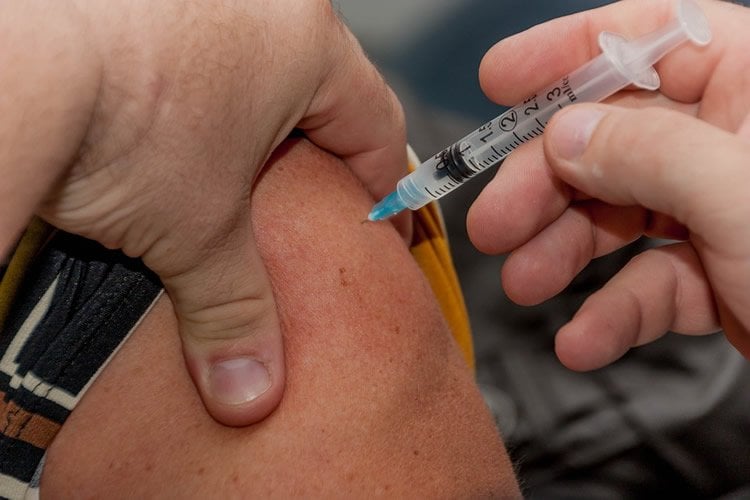Summary: Researchers say better adherence to vaccines is needed to help prevent measles epidemics occurring in the U.S.
Source: American College of Physicians.
More than half of U.S. travelers who are eligible for the measles, mumps, and rubella (MMR) vaccine are not getting vaccinated before leaving the country, despite clinical recommendations. This is an important issue because most measles outbreaks in the U.S. can be traced back to returning travelers who become infected abroad. The findings are published in Annals of Internal Medicine.
Routine assessment of measles immunity and vaccination with MMR before international travel is an essential means to reduce measles importations. A single case of imported measles can lead to many secondary and tertiary cases, as measles is highly infectious; 90 percent of exposed, unvaccinated people will become ill with measles after entering a room that had housed an infected person up to two hours beforehand. As such, the CDC Advisory Committee on Immunizations recommends two documented doses of MMR vaccine for adult international travelers without other evidence of measles immunity, meaning a positive blood test or documented measles infection or birth before 1957.
Researchers from Massachusetts General Hospital in Boston sought to determine how clinicians who are experienced in providing pre-travel medical advice assess for measles immunity at pre-travel medical encounters and reasons for non-vaccination among patients who were eligible for the vaccine. The researchers analyzed data recorded between 2009 to 2014 from 24 GlobalTravEpiNet clinics. Of the 40,810 individuals included in the analysis, 6,612 (16 percent) were eligible for the MMR vaccine, yet more than half of them opted not to receive the vaccine. Most of those who refused the vaccine (74 percent), reported doing so because they were not concerned about the disease. However, in more than a quarter of cases, the provider actually deemed the vaccine unnecessary.

According to the researchers, these findings underscore the need for strategies to improve provider and traveler knowledge of measles as a travel-related illness and the need to increase pre-travel uptake of the MMR vaccine. They say that improving vaccination rates is particularly important in communities with a higher percentage of nonimmune individuals.
Funding: Centers for Disease Control and Prevention, National Institutes of Health, and the Steve and Deborah Gorlin MGH Research Scholars Award funded this project.
Source: Cara Graeff – American College of Physicians
Image Source: NeuroscienceNews.com image is in the public domain.
Original Research: Abstract for “Missed Opportunities for Measles, Mumps, Rubella Vaccination Among Departing U.S. Adult Travelers Receiving Pretravel Health Consultations” by Emily P. Hyle, MD, MSc; Sowmya R. Rao, PhD; Emily S. Jentes, PhD, MPH; Amy Parker Fiebelkorn, MSN, MPH; Stefan H.F. Hagmann, MD, MSc; Allison Taylor Walker, PhD, MPH; Rochelle P. Walensky, MD, MPH; Edward T. Ryan, MD; and Regina C. LaRocque, MD, MPH in Annals of Internal Medicine. Published online May 15 2017 doi:10.7326/M16-2249
[cbtabs][cbtab title=”MLA”]American College of Physicians “More Than Half of Eligible US Travelers Skip Their Pre-Trip Measles Vaccine.” NeuroscienceNews. NeuroscienceNews, 15 May 2017.
<https://neurosciencenews.com/mmr-us-travelers-vaccinations-6687/>.[/cbtab][cbtab title=”APA”]American College of Physicians (2017, May 15). More Than Half of Eligible US Travelers Skip Their Pre-Trip Measles Vaccine. NeuroscienceNew. Retrieved May 15, 2017 from https://neurosciencenews.com/mmr-us-travelers-vaccinations-6687/[/cbtab][cbtab title=”Chicago”]American College of Physicians “More Than Half of Eligible US Travelers Skip Their Pre-Trip Measles Vaccine.” https://neurosciencenews.com/mmr-us-travelers-vaccinations-6687/ (accessed May 15, 2017).[/cbtab][/cbtabs]
Abstract
Missed Opportunities for Measles, Mumps, Rubella Vaccination Among Departing U.S. Adult Travelers Receiving Pretravel Health Consultations
Background:
Measles outbreaks continue to occur in the United States and are mostly due to infections in returning travelers.
Objective:
To describe how providers assessed the measles immunity status of departing U.S. adult travelers seeking pretravel consultation and to assess reasons given for nonvaccination among those considered eligible to receive the measles, mumps, rubella (MMR) vaccine.
Design:
Observational study in U.S. pretravel clinics.
Setting:
24 sites associated with Global TravEpiNet (GTEN), a Centers for Disease Control and Prevention–funded consortium.
Patients:
Adults (born in or after 1957) attending pretravel consultations at GTEN sites (2009 to 2014).
Measurements:
Structured questionnaire completed by traveler and provider during pretravel consultation.
Results:
40 810 adult travelers were included; providers considered 6612 (16%) to be eligible for MMR vaccine at the time of pretravel consultation. Of the MMR-eligible, 3477 (53%) were not vaccinated at the visit; of these, 1689 (48%) were not vaccinated because of traveler refusal, 966 (28%) because of provider decision, and 822 (24%) because of health systems barriers. Most MMR-eligible travelers who were not vaccinated were evaluated in the South (2262 travelers [65%]) or at nonacademic centers (1777 travelers [51%]). Nonvaccination due to traveler refusal was most frequent in the South (1432 travelers [63%]) and in nonacademic centers (1178 travelers [66%]).
Limitation:
These estimates could underrepresent the opportunities for MMR vaccination because providers accepted verbal histories of disease and vaccination as evidence of immunity.
Conclusion:
Of U.S. adult travelers who presented for pretravel consultation at GTEN sites, 16% met criteria for MMR vaccination according to the provider’s assessment, but fewer than half of these travelers were vaccinated. An increase in MMR vaccination of eligible U.S. adult travelers could reduce the likelihood of importation and transmission of measles virus.
“Missed Opportunities for Measles, Mumps, Rubella Vaccination Among Departing U.S. Adult Travelers Receiving Pretravel Health Consultations” by Emily P. Hyle, MD, MSc; Sowmya R. Rao, PhD; Emily S. Jentes, PhD, MPH; Amy Parker Fiebelkorn, MSN, MPH; Stefan H.F. Hagmann, MD, MSc; Allison Taylor Walker, PhD, MPH; Rochelle P. Walensky, MD, MPH; Edward T. Ryan, MD; and Regina C. LaRocque, MD, MPH in Annals of Internal Medicine. Published online May 15 2017 doi:10.7326/M16-2249






